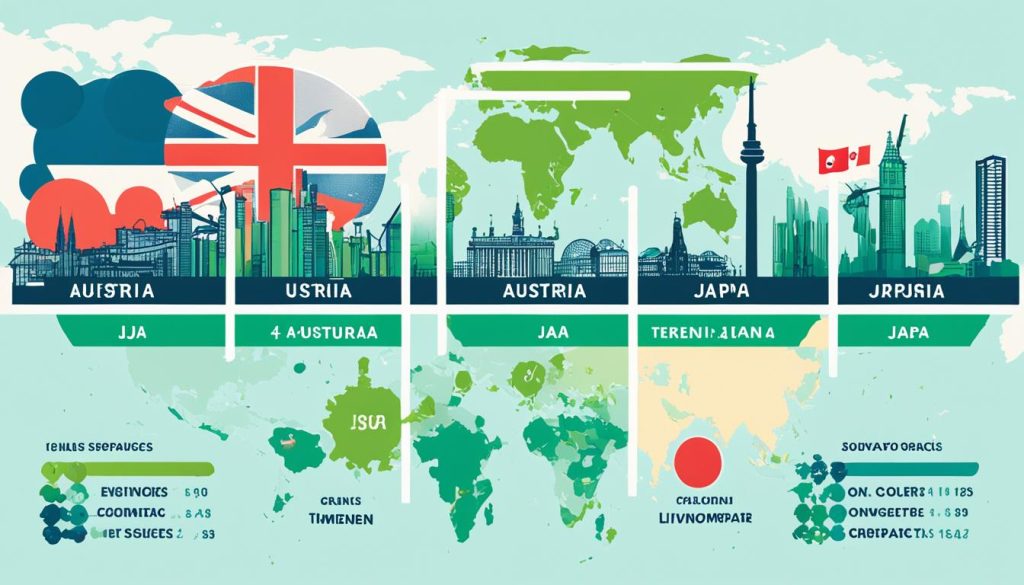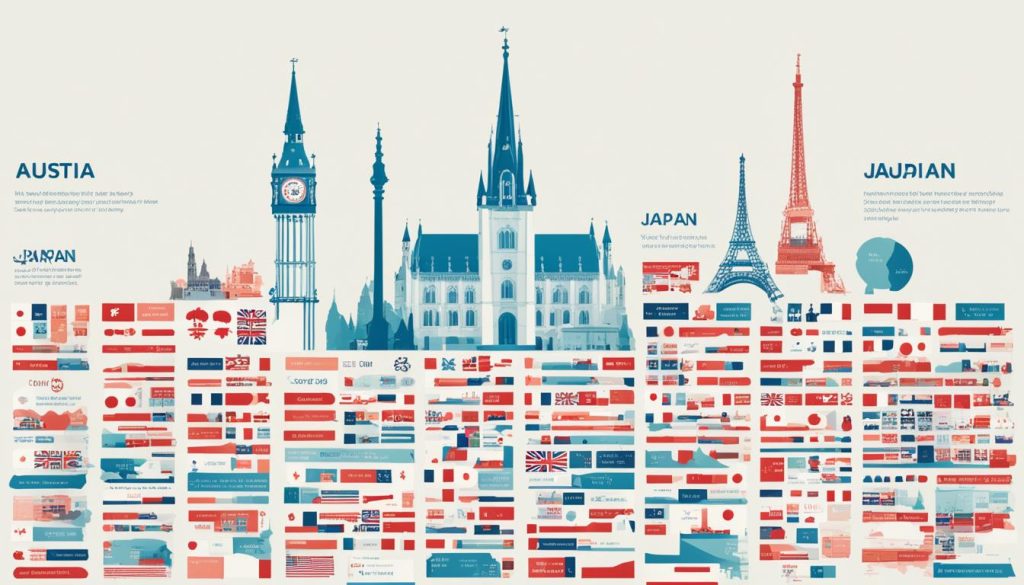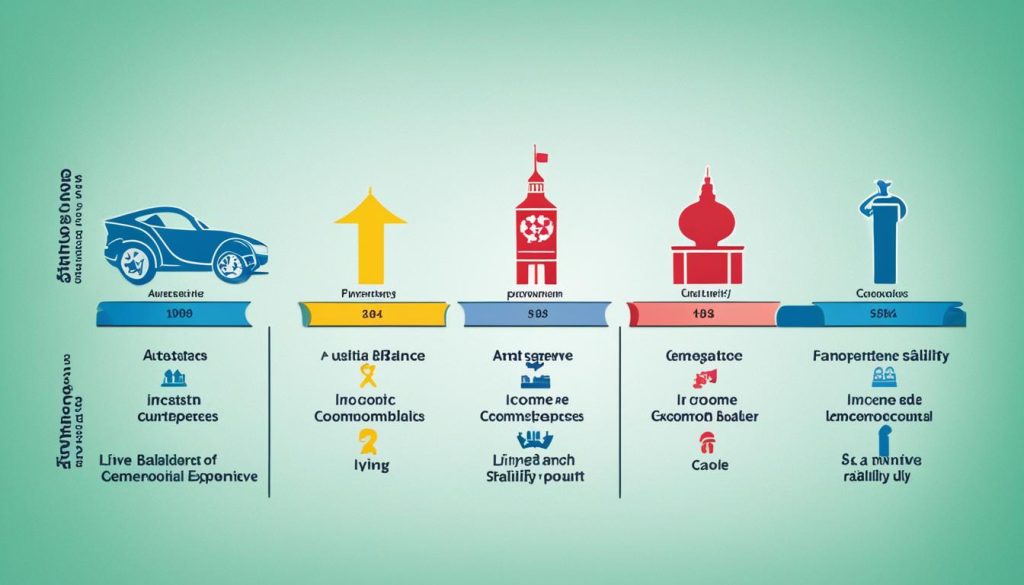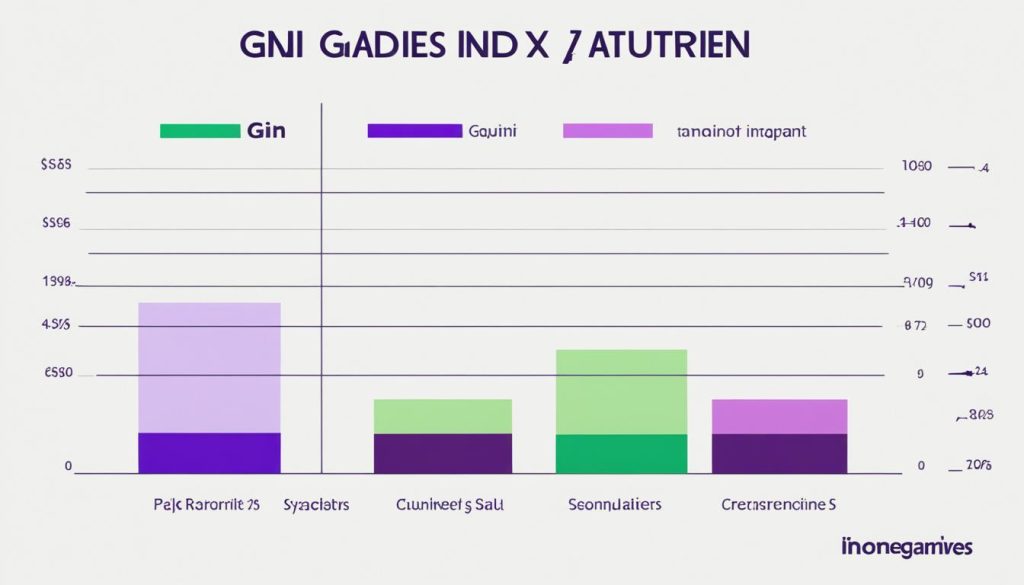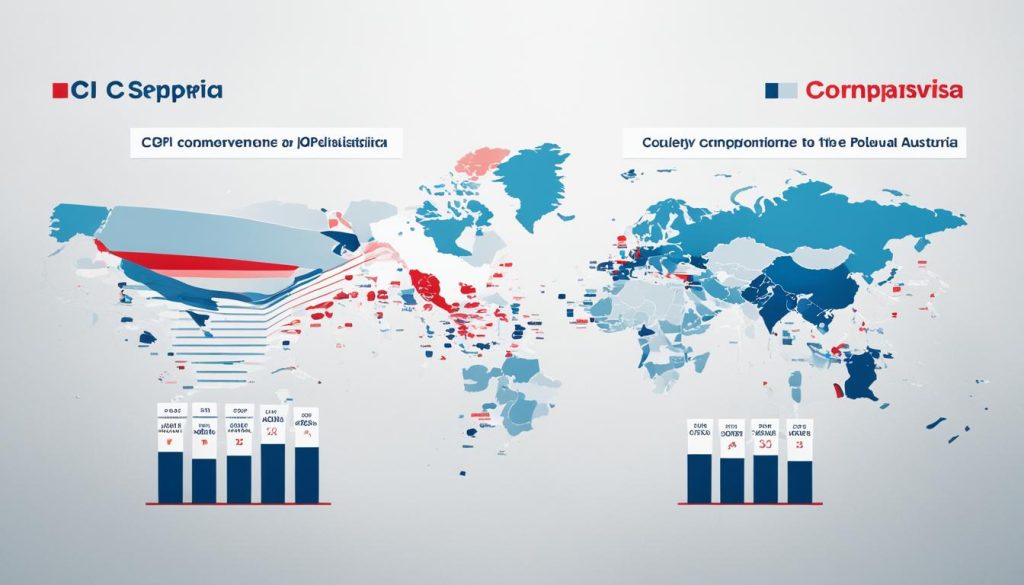We’re looking into the economies of Austria, the UK, and Japan. It’s a chance to see how their policies and cultures affect living standards. Austria, the UK, and Japan are interesting because they’re all different. Let’s dive into how their economies support their people’s lifestyles and living conditions.
We’re exploring the quality of life in Austria, the UK, and Japan. It’s about seeing how wealth affects people’s daily lives in these countries. By comparing them, we hope to understand the links between money, culture, and happiness. This will show us how each country’s unique economy and culture shape life there.
Economic Prospects in Austria, the UK, and Japan
To understand how strong world economies are, we look at key signs. These include the Gross Domestic Product (PPP), inflation, and unemployment levels. They show us a country’s wealth, economic health, and job market condition. These signs tell us about growth and how well an economy is doing. It’s vital to keep prices stable and make the economy work for everyone.
Gross Domestic Product (GDP) Comparison
Japan’s economy is bigger than the UK’s when we look at GDP (PPP). Japan has a GDP of $5749 billion, whereas the UK has $3028 billion. This shows Japan’s big role in the world economy. It affects both wealth and living standards within its borders.
Inflation Rates and Global Market Impact
Judging by inflation, Japan has a more stable economy than the UK. Japan’s inflation is at 2.5%, and the UK’s is at 7.9%. This shows Japan manages its economy well. Inflation influences global markets and living costs, too.
Unemployment Trends Across the Three Nations
- Japan has a low unemployment rate of 2.9%. This suggests its job market is strong, showing hope for its economic future.
- The UK’s unemployment rate is 4.4%. This is higher but shows that with the right policies, things can get better.
The differences in unemployment show the economic health and growth potential of these countries. These variations affect policies and international strategies.
Cost of Living Index: A UK, Austria, and Japan Analysis
Understanding the cost of living is key for people moving or managing finances. Looking at living costs in different countries shows the money needed for a decent life there. Japan’s cost index is 84.9, showing lower expenses than the US, the base index.
The UK’s index is 98.5, showing it’s pricier, affecting budget plans. Austria’s living cost, at 83.1, is a bit cheaper than Japan’s.
Here’s a breakdown to help understand expense differences:
- House Rent: Rent is a big expense, affecting living costs.
- Utilities: Bills for electricity, heating, and water increase expenses.
- Groceries and Dining: Food, whether from stores or restaurants, affects costs.
- Transportation: Costs of public and private travel impact daily expenses.
- Leisure activities: Budgeting for fun and social life is crucial.
These factors shape a country’s living cost. Knowing them helps manage finances effectively. Analyzing living costs aids in balancing expenses and enjoyment of life.
Education and Literacy: Cornerstones of National Progress
Investing in education lays the foundation for a strong future workforce. It enriches society and boosts educational success. The United Kingdom and Japan invest a lot in education. This shows they are focused on creating a better future.
Education Expenditure as GDP Percentage
The UK is noteworthy for its education spending. It uses 5.5% of its GDP for education. This big investment supports a top-quality education system. It shows the UK’s commitment to giving its youth the tools for success.
School Life Expectancy and Its Implications
In the UK, students can expect 19 years of schooling. This is more than Japan’s 15 years. The longer time in school in the UK suggests a commitment to higher education levels. It prepares students for the future job market.
- More funds for education mean better learning places and student achievements.
- A longer time in school helps build a diverse, skilled workforce.
- Ensuring quality education helps address future social and economic challenges.
As countries face a global competition, investing in education is key. It helps achieve lasting success and improves societal well-being.
Healthcare Systems: Hospital Beds and Physician Ratio
Looking at a country’s healthcare, we see how good it is at helping people. This means checking the number of hospital beds and doctors available. By comparing Japan and the UK, we understand the healthcare quality they offer.
Japan has 13.4 hospital beds for every 1,000 people. This shows they have a strong system ready to take care of patients. The UK, however, only has 2.8 beds for the same number of people. This difference makes us wonder how the UK ensures everyone gets the care they need.
In terms of doctors, the UK is slightly ahead of Japan. It has 2.81 doctors per 1,000 people, while Japan has 2.41. This indicates the UK’s focus on having plenty of skilled doctors to look after patients.
The gap in healthcare quality between Japan and the UK tells us about their health policies. It reflects how each country plans to meet its healthcare challenges.
Purchasing Power Parity: Dissecting Income vs Living Expenses
Understanding purchasing power parity is key to knowing how well people live in different countries. It shows us not just what people earn but also what they can buy with their money. By looking at this, we can see if someone can have a good life with their earnings.
Average Monthly Income and Affordability
When we compare wages to living costs, we get an idea of a country’s economic health. Take Japan where the average monthly income is about $3,537 USD and the purchasing power is 65.1. The UK shows a similar picture with average earnings of $4,103 USD and the same purchasing power index. This similarity shows people in both places have a fair chance to cover their needs and have some money left.
Consumer Goods Prices: A Comparative Review
Lets look at how much goods cost and what this means for people’s budgets. In Japan, consumer goods are at an index of 84.9, meaning even with good wages, the prices are reasonable. Yet, in the UK, the index hits 98.5, showing that Britons might feel their money doesn’t stretch as far. These figures help us understand the financial pressures on average earners.
- Average wages in Japan and the UK contribute to stable financial security amid fluctuating market prices.
- Disposable income is closely linked to consumer spending tendencies in both economies.
- The purchasing power parity index underscores the affordability and economic accessibility within the analysed nations.
- Consumer goods price index provides insights into market-driven constraints on day-to-day expenditures.
Socio-Economic Inequality: The Gini Index and Income Distribution
We need to look at how wealth differs across societies. The Gini coefficient helps us see this wealth gap. A low Gini score means wealth is spread out fairly. But, a high score shows big gaps in wealth.
The Gini Index does more than just show numbers. It tells us about a country’s view on wealth sharing. By studying this index, we learn if a country tries to make wealth more equal. We also see if their efforts are working.
Talking about wealth gaps isn’t just about numbers. It’s also about what people believe is fair. It involves our culture and how we govern. These things shape how we deal with wealth differences.
- The mechanics of computing the Gini coefficient.
- Trends and fluctuations in the Gini Index over recent years.
- The correlation between income inequality and social mobility.
- Impact of wealth distribution on communal fabric and individual prosperity.
- Potential policy implications aimed at ameliorating income inequality.
- Comparative analysis of countries with low and high Gini coefficients.
Making wealth distribution fairer is key to good economic policies. It’s a tough challenge. We need careful analysis and active steps by those in charge. This can help make society fairer for everyone.
Quality of Living Indicators: A Cross-Country Survey
Looking at what makes life good, we focus on happiness, well-being, and life satisfaction. These key factors are highlighted in the World Happiness Report. They show how happy and supported people feel in their countries. Likewise, clean air and good urban planning are crucial. They affect people’s health and happiness.
World Happiness Report Findings
The World Happiness Report reveals a strong link between happiness and a country’s prosperity. Happy countries often have great social support, public services, and fair wealth sharing. These factors together improve the happiness of people.
Assessing the Urban Environment: Pollution and Infrastructure
Cities need good planning for a healthy environment. For instance, strict air quality rules make people healthier and happier. Also, good infrastructure like parks, transport, and housing is key. It makes city life better and people happier.
- Inspection of happiness rankings to gauge emotional and psychological well-being
- Evaluation of life satisfaction levels across different societal strata
- Analysis of air quality metrics as indicators of environmental stewardship
- Exploration of urban development plans and their impact on daily living conditions
The happiness ranking of nations depends on several factors. Strong social support, clean air, and smart urban planning are vital. Together, they lead to high life satisfaction. As a result, societies are happier and thrive.
Natural Environment and Geographic Appeal
Exploring a country’s natural resources and geography shows how important the environment and land use are. They are not just static but actively help the economy and improve people’s lives. They affect everything from tourism to how the locals live.
Analysing Forest and Agricultural Land Coverage
Forests show how committed a country is to caring for the environment. Japan, with 68.5% forest coverage, is dedicated to protecting its natural spaces. This highlights how crucial natural resources are for the health of our planet.
In contrast, the UK focuses on farming, with 71% of its land used for agriculture. This shows the UK values farming and the rural economy highly.
Coastlines and Natural Beauty as Attraction Factors
Coastlines are some of the most beautiful parts of a country, attracting tourists and locals with their beauty and sea life. Japan has a long coastline of 29,751 km, great for tourism and showing off its island nature. The UK also uses its lovely 12,429 km coastline to boost tourism and help coastal towns thrive.
- Japan’s dense forests as a beacon of environmental conservation
- UK’s land use informed by its prioritisation of agriculture for domestic and international needs
- Expansive coastlines promoting tourism and reinforcing cultural links with the maritime environment
Political Stability and Corruption Perceptions Index (CPI)
A nation’s stability depends on its political landscape and governance. This affects how much people trust the government. Having clear rules helps create a space where corruption struggles to grow. The Corruption Perceptions Index (CPI) measures how the public sees corruption in government. It shows how well a country’s governance is doing.
People need to trust that their leaders and civil servants are honest and responsible. Being open about government actions helps to keep corruption at bay. It makes democracy and governance better. Looking at the CPI helps us see if a country is on track in these important areas.
- High CPI scores mean good governance and less corruption. This builds trust among citizens.
- Low CPI scores suggest a country needs to fix its transparency. This can help regain people’s trust.
To understand a country’s governance, we need to know its CPI score. Working to make things clearer is essential. We can do this through legal changes, getting people involved, and strong checks. This effort to be more transparent is crucial for meeting citizens’ needs and expectations.
There’s a strong link between governance, being open, and earning the public’s trust. Working hard to keep government systems transparent is vital. Open systems are less likely to lose people’s trust. They’re better at creating a stable bond between the state and its people.
Cultural and Lifestyle Factors in Austria, Japan, and the UK
Exploring Austria, Japan, and the UK shows us how food, drink, and fun impact life quality. These elements are crucial, offering joy and adding to each country’s leisure appeal.
Food and Drink: Culinary Traditions and Innovations
In Austria, Japan, and the UK, the food scene is a mix of old and new tastes. Each country’s cuisine takes you on a unique taste journey. This highlights the wide variety in world food arts.
- Austria delights with Schnitzel and Apfelstrudel, adding rustic charm to its cuisine.
- Japan shines with Sushi and Ramen, showing precise, simple beauty in its food.
- The UK is known for Fish and Chips and Sunday Roast, keeping cherished flavours alive.
Leisure and Recreation: How Countries Compare
Austria, Japan, and the UK offer diverse fun options, improving life quality. From Austria’s skiing to Japan’s calming gardens, and the UK’s lively football games. Each has its own style of fun and rest.
- Austria enjoys alpine hikes and classical music events as key pastimes.
- Japan combines martial arts and gaming, blending tradition with modern fun.
- The UK provides cultural sights and green spaces for relaxation and joy.
Looking into these activities shows they improve lifestyle and happiness in diverse ways. They are all about making life richer.
Demographic Dynamics: Ageing Populations and Urbanisation
Countries change over time, and so do their people. Austria, the United Kingdom, and Japan are seeing big shifts. They have more older people, cities are growing, and there are changes in how many babies are born. These changes affect the whole country socially and economically.
More people are getting older in these countries. This means the average age is going up. There are more elderly, and fewer babies are being born. This situation is hard for countries. They need to think about how to take care of older people and keep everything running smoothly.
At the same time, cities are becoming bigger and more important. They are the heart of business and culture. Young people move to cities for jobs, making them full of life. Yet, this growth brings problems like expensive houses and the need for good city services.
- Different countries grow in unique ways but they all face common challenges. They need to think carefully about how to manage growth.
- Getting older affects many things like houses and what people buy. Countries must plan products and ads for all ages.
Looking ahead, countries must plan well for an older and more city-loving population. They must understand people’s needs to keep society together and the economy strong. Adapting to these shifts is key for a good future.
Each country has its own way of dealing with these changes. But, it’s crucial to study these trends deeply. This helps build strong communities that can handle the challenges of getting older and city growth.
Public Debt and Fiscal Responsibility
Looking into the effects of national debt, government borrowing, and economic sustainability is key. We analyze how countries like Austria, the UK, and Japan handle their money matters. This shows us their financial health now and their chance for a stable economy later.
Austria stands out for keeping its national debt lower compared to its GDP. They have been careful with government borrowing. This is to ensure future generations are not weighed down by debt.
In the UK, the approach has been to borrow more to boost growth and tackle social issues. However, this has led to increased national debt. This raises questions about economic sustainability.
Japan, with the highest debt to GDP ratio in the world, has a different story. Most of its debt is owned within the country. This lowers the risk a bit. Still, Japan manages to have low borrowing costs, showing investor trust in its economic policies.
- Examination of fiscal policies and debt management.
- Impact of these policies on economic growth and stability.
- Domestic versus foreign ownership of national debt.
Handling national debt and government borrowing is about balancing today’s needs with tomorrow’s duties. All these countries aim for economic sustainability. They just take different paths to get there.
Housing and Real Estate Markets
The health of housing and real estate markets is key for economic strength. These markets’ flow from home ownership to renting sets housing cost standards. This affects people’s financial well-being. Looking at current trends shows how accommodation costs influence living expenses.
Home Ownership and Renting: Understanding Market Trends
When we look at the property market, we often debate owning versus renting. In Austria, the UK, and Japan, attitudes and economy shape trends. This affects people’s choices toward owning or investing. These patterns affect market dynamics and house prices.
Impact of Housing Costs on Overall Quality of Life
For many, housing costs are a big part of living expenses. High accommodation costs affect day-to-day living and well-being. When these costs rise or stay stable, it impacts financial health. Thus, being able to afford a home is crucial for a stable, good life.
- Exploring the variance in rental and ownership rates across nations and their influence on the property market.
- Understanding how real estate investment is approached in countries with divergent economic strategies.
- Analysing the link between accommodation costs and overall living expenses in the context of a global economy.
- Assessing how housing costs impact lifestyle choices and the financial security of households.
Conclusion
This analysis compared Austria, the United Kingdom, and Japan. It looked at their economies, healthcare, education, and life quality. The review shows how each country’s strengths contribute to its people’s welfare. It highlights the mix of cultural, economic, and social factors in their living standards.
The study explored GDP, inflation, healthcare, and education. It shows how policy decisions affect living standards. Japan is noted for economic stability, Austria for cost-effective living, and the UK invests heavily in education. It also points out the Gini Index and CPI’s role in measuring a nation’s health, not just its wealth.
This review gives a full picture, not just numbers. It talks about balancing economy and quality of life. For anyone looking to move to these countries, this guide is vital. It shows the visible and invisible qualities that make up the life in Austria, the UK, and Japan.


